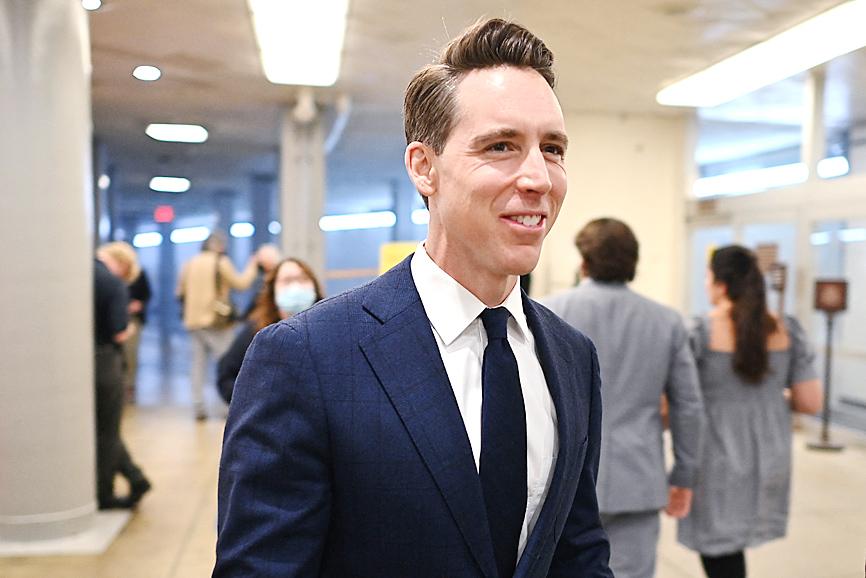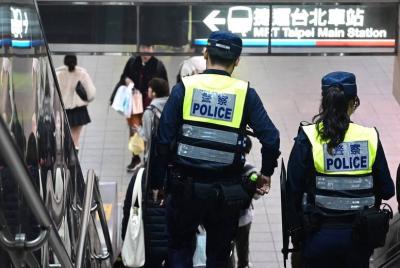US Senator Josh Hawley on Tuesday proposed legislation that he said would “strengthen Taiwan’s defenses against a Chinese invasion” through training, equipment and other means of support provided by the US.
Taiwan is facing growing intimidation from Beijing and the threat of a Chinese invasion is “expected to reach especially dangerous levels by the latter half of the 2020s,” the proposed “arm Taiwan act of 2021” says.
Taiwan should speed up its deployment of cost-effective and resilient asymmetric defense capabilities to defend itself effectively, the bill says.

Photo: AFP
It stipulates that the US secretary of defense form a “Taiwan Security Assistance Initiative” to help Taiwan achieve this goal.
Under the bill, the US would allocate US$3 billion annually for such an initiative from 2023 through 2027 to provide assistance to the Taiwanese government, such as equipment, training and other support.
Such assistance would be based on Taiwan demonstrating its own commitment to and progress in building a credible asymmetric defense that matches US efforts, it says.
The proposed bill’s annual budget cannot be allocated unless Taiwan invests an equivalent amount in asymmetric defense capabilities during the same period, it says, specifying that Taiwan should commit to spend at least 3 percent of GDP on defense from 2023 to 2027.
Taiwan currently spends about 2.36 percent of GDP on defense, up from 1.84 percent in 2018 and 2.16 percent in 2019, government figures show.
The bill also urges the US government to encourage its allies and partners to “sell, lease or otherwise provide appropriate asymmetric defense capabilities to Taiwan.”
“The Arm Taiwan Act will ensure Taiwan has the asymmetric defenses it needs to deter a Chinese invasion — so long as Taiwan is prepared to make the difficult choices required to defend itself in the hard years ahead,” Hawley said in a statement.
“If China’s recent actions have shown the world anything, it’s that Beijing will stop at nothing in its quest to dominate the Indo-Pacific and then the world,” he said.
“We should do everything in our power to help Taiwan urgently strengthen its defenses,” Hawley wrote.

Beijing could eventually see a full amphibious invasion of Taiwan as the only "prudent" way to bring about unification, the US Department of Defense said in a newly released annual report to Congress. The Pentagon's "Annual Report to Congress: Military and Security Developments Involving the People's Republic of China 2025," was in many ways similar to last year’s report but reorganized the analysis of the options China has to take over Taiwan. Generally, according to the report, Chinese leaders view the People's Liberation Army's (PLA) capabilities for a Taiwan campaign as improving, but they remain uncertain about its readiness to successfully seize

Taiwan is getting a day off on Christmas for the first time in 25 years. The change comes after opposition parties passed a law earlier this year to add or restore five public holidays, including Constitution Day, which falls on today, Dec. 25. The day marks the 1947 adoption of the constitution of the Republic of China, as the government in Taipei is formally known. Back then the Chinese Nationalist Party (KMT) governed China from Nanjing. When the KMT, now an opposition party in Taiwan, passed the legislation on holidays, it said that they would help “commemorate the history of national development.” That

Taiwan has overtaken South Korea this year in per capita income for the first time in 23 years, IMF data showed. Per capita income is a nation’s GDP divided by the total population, used to compare average wealth levels across countries. Taiwan also beat Japan this year on per capita income, after surpassing it for the first time last year, US magazine Newsweek reported yesterday. Across Asia, Taiwan ranked fourth for per capita income at US$37,827 this year due to sustained economic growth, the report said. In the top three spots were Singapore, Macau and Hong Kong, it said. South

Police today said they are stepping up patrols throughout the Taipei MRT system, after a social media user threatened to detonate a bomb at an unspecified station this afternoon. Although they strongly believe the threat to be unsubstantiated, Taipei Metro police and the Railway Police Bureau still said that security and patrols would be heightened through the system. Many copycat messages have been posted since Friday’s stabbing attacks at Taipei Main Station and near Zhongshan MRT Station that left three dead and 11 injured, police said. Last night, a Threads user in a post said they would detonate a bomb on the Taipei